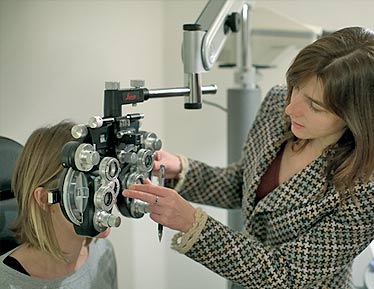Your questions answered
Every month, we’ll be publishing interviews with members of staff to give you an inside look into the people that make the London Vision Clinic such a special place to be a patient, and to work!
This month’s interview is with Emma Brandon, one of the Optometrists working at the London Vision Clinic.

Q. Emma, why did you choose this career?
Emma Brandon: I first studied a BSc in Physiology, which while being scientifically interesting did not open a direct career path. I wanted a more hands on approach and particularly enjoyed the physiology of vision. This coupled with the fact that I had been considerably myopic since early childhood influenced my decision to study Optometry.
Q. I see. And what attracted you about refractive surgery, specifically?
Emma Brandon: On qualifying, I quickly became involved with refractive surgery, as this area is one of the most exciting and rapidly evolving fields in eye care. In the past nine years I have seen phenomenal changes, and haven’t stopped learning.
Q. So, what has it been like since also becoming a patient?
Emma Brandon: Indeed having my own treatment was not only a fantastic experience as a patient but also added another dimension to my professional skills.
Q. How are you involved with patients after their surgery?
Emma Brandon: Post operatively this role also applies. Once again assessing the recovery and progress after surgery, and also dealing with any other potentially unrelated ocular health issues which may arise. It is extremely important to remain 100% professional at all times. There is no such thing as an off day where patients are concerned!
Q. I’m sure your patients appreciate that you’ve gone through the process yourself. Tell me, what do you do personally for your professional development?
Emma Brandon: Well, the most important professional decision I have made recently is embarking on a part time MSc course, which is challenging but hugely rewarding to fit around a busy working life. Already, I feel the benefits to my general professional skills. I also keep up to speed with the refractive surgery world through regular attendance at conferences, and have recently completed a three year term as Vice President for the British Society for Refractive Surgery.
Q. That sounds like a busy schedule… As a professional, what do you see as your primary and secondary roles within the clinic?
Emma Brandon: My primary role is undoubtedly patient care, from pre-operative assessment through to post-op care, and the administrative tasks surrounding this. I am proud to be working at one of the highest standards on a global scale. We constantly strive to achieve the best and have access to some of the finest technology to help us. My secondary role is to work as an active team member with my colleagues. This is imperative for the smooth running of our busy clinic, and for job fulfillment.
Q. Can you describe a situation with a patient where the patient disagreed with your recommendation. How did you handle this?
Emma Brandon: I believe that the most important action to take in this situation is to listen in full to the patients reason for disagreeing, not forgetting the fact that they could be in the right. Secondly, to acknowledge my understanding of the disagreement, and thirdly to simply and clearly explain why a course of action was recommended in the first place. Alternatively, if it is a situation where the patient is correct and a mistake has been made, making big steps to rectify the problem.
Q. In your current position, how much time would you say you spend directly with patients throughout the day and what specifically do you do with them?
Emma Brandon: Currently the vast majority of my day is spent directly with patients. I carry out an extensive number of assessments both pre and post-operatively. Pre-operatively, I not only assess a patient’s suitability for surgery and formulate a treatment plan, but also carry out a fully comprehensive eye examination addressing any other issues.
A significant proportion of time is spent counseling patients, addressing their questions and concerns and making sure they feel as comfortable and relaxed as possible whilst in clinic.
Read our full Laser Eye Surgery FAQ section.


